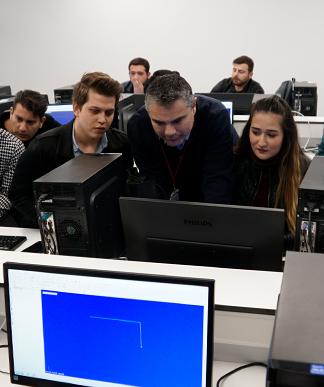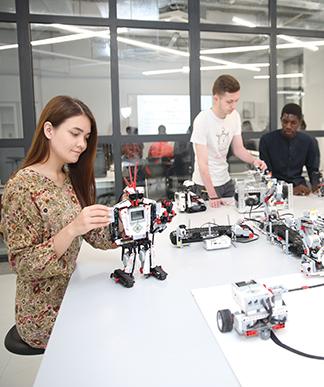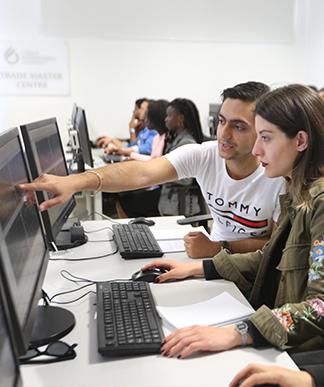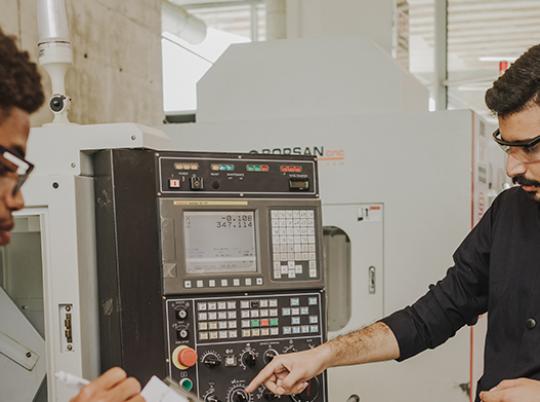


About the Program
Our alumni earn the title of Industrial Engineer, trained to work in any country, offering expert support in management and suggesting solutions to managers at all levels. by using scientific methods. Career options are also possible in public, commercial, service, industrial, design, health institutions, and even military sectors. Moreover, graduates can also pursue master’s degree in any subject relevant to industrial engineering. The academic staff, in addition to offering courses, undertake scientific research and present them in conferences or publish them in journals. Some of these studies are on current issues such as job security and workers’ health, engineering management, and industry-environment relationship management. In addition to the curriculum courses, students not only visit industrial plants on technical trips, but also attend conferences abroad presenting studies of their completed projects.
Education Opportunities
The Industrial Engineering Program has harmony between theoretical, practical, and elective courses. The elective courses allow students to benefit from the fields of computer sciences, basic sciences, administration sciences, contemporary communications, statistics, and the science of probability. The theoretical components of the courses are enhanced by course projects, graduation projects, and 20-day summer internships, which lead to the consolidation of gained knowledge and increase career opportunities. Students’ knowledge and abilities increase by using specialized software involving the human factor in an ergonomics laboratory, offering a suitable environment for design development. Therefore, it enables both the production and service sectors to function more effectively.

Accreditations
Industrial Engineering Program Accreditation was given by the Engineering Education Programs Evaluation and Accreditation Association (MÜDEK) in May 2018. In addition to the accreditation, the program has also been awarded the European Accredited Engineer Label EUR-ACE.
Click to learn more about the Industrial Engineering Program's mission, outcomes and educational goals.
Career Areas
The Industrial Engineering Program has harmony between theoretical, practical, and elective courses. The elective courses allow students to benefit from the fields of computer sciences, basic sciences, administration sciences, contemporary communications, statistics, and the science of probability. The theoretical components of the courses are enhanced by course projects, graduation projects, and 20-day summer internships, which lead to the consolidation of gained knowledge and increase career opportunities. Students’ knowledge and abilities increase by using specialized software involving the human factor in an ergonomics laboratory, offering a suitable environment for design development. Therefore, it enables both the production and service sectors to function more effectively.
Contact
Faculty of Engineering
Science and Technology Center, ST 226
Tel: +90 392 671 1111 Extension: 2401
Faculty E-mail: secretary-fe@ciu.edu.tr
Head of Department: Prof. Dr. Mustafa DAĞBAŞI
Head of Department E-mail: mdagbasi@ciu.edu.tr
Compulsory Courses
First Semester
GENERAL CHEMISTRY
Course code
CHEM110Credit
4Theoretical
3Practical
2Ects
6INTRODUCTION TO COMPUTING
Course code
CMPE101Credit
3Theoretical
2Practical
2Ects
5READING AND WRITING SKILLS-I
Course code
ENGL141Credit
3Theoretical
2Practical
2Ects
4HISTORY OF CIVILIZATION
Course code
HIST100Credit
0Theoretical
2Practical
0Ects
2INTRODUCTION TO INDUSTRIAL ENGINEERING
Course code
INDE100Credit
0Theoretical
1Practical
0Ects
2CALCULUS-I
Course code
MATH101Credit
4Theoretical
3Practical
2Ects
5LINEAR ALGEBRA
Course code
MATH121Credit
2Theoretical
2Practical
0Ects
3MODERN TURKISH HISTORY
Course code
TARH100Credit
0Theoretical
2Practical
0Ects
2Second Semester
INTRODUCTION TO PROGRAMMING
Course code
CMPE112Credit
4Theoretical
3Practical
2Ects
6READING AND WRITING SKILLS-II
Course code
ENGL142Credit
3Theoretical
2Practical
2Ects
4CALCULUS-II
Course code
MATH102Credit
4Theoretical
3Practical
2Ects
5DISCRETE MATHEMATICS
Course code
MATH122Credit
3Theoretical
3Practical
1Ects
4GENERAL PHYSICS-I
Course code
PHYS101Credit
4Theoretical
3Practical
2Ects
6TURKISH LANGUAGE
Course code
TREG100Credit
0Theoretical
2Practical
0Ects
2TURKISH
Course code
TURK100Credit
0Theoretical
2Practical
0Ects
2Third Semester
ENGINEERING DRAWING
Course code
CVLE101Credit
3Theoretical
2Practical
3Ects
5MICROECONOMICS
Course code
ECON101Credit
3Theoretical
3Practical
0Ects
7FREE ELECTIVE
Course code
EFEX11Credit
3Theoretical
3Practical
0Ects
4DIFFERENTIAL EQUATIONS
Course code
MATH203Credit
3Theoretical
3Practical
1Ects
5INTRODUCTION TO PROBABILITY AND STATISTICS
Course code
MATH205Credit
4Theoretical
4Practical
1Ects
6GENERAL PHYSICS-II
Course code
PHYS102Credit
4Theoretical
3Practical
2Ects
6Fourth Semester
MACROECONOMICS
Course code
ECON102Credit
3Theoretical
3Practical
0Ects
7PROBABILITY & COMPUTER APPLICATIONS IN INDUSTRIAL ENGINEERING
Course code
INDE204Credit
4Theoretical
3Practical
2Ects
5MATERIALS & MANUFACTURING PROCESSES
Course code
INDE212Credit
4Theoretical
4Practical
1Ects
5INTRODUCTION TO MODELING & OPTIMIZATION
Course code
INDE221Credit
3Theoretical
3Practical
1Ects
5ENGINEERING ECONOMY
Course code
INDE232Credit
3Theoretical
3Practical
0Ects
4ENGINEERING MANAGEMENT
Course code
INDE282Credit
3Theoretical
3Practical
0Ects
4Fifth Semester
FREE ELECTIVE
Course code
EFEX12Credit
3Theoretical
3Practical
0Ects
4SUMMER TRAINING-I
Course code
INDE200Credit
0Theoretical
0Practical
0Ects
2WORK STUDY
Course code
INDE313Credit
4Theoretical
3Practical
2Ects
6OPERATIONS RESEARCH I
Course code
INDE321Credit
4Theoretical
3Practical
2Ects
6PRODUCTION PLANNING I
Course code
INDE341Credit
3Theoretical
3Practical
1Ects
5SYSTEMS MODELLING & SIMULATION
Course code
INDE353Credit
4Theoretical
3Practical
2Ects
6Sixth Semester
HUMAN FACTORS ENGINEERING
Course code
INDE314Credit
4Theoretical
3Practical
2Ects
6OPERATIONS RESEARCH II
Course code
INDE322Credit
4Theoretical
3Practical
2Ects
6PRODUCTION PLANNING II
Course code
INDE342Credit
3Theoretical
3Practical
1Ects
6INFORMATION SYSTEMS & IMPLEMENTATION
Course code
INDE352Credit
3Theoretical
3Practical
1Ects
6PRODUCTION SYSTEMS & TECHNOLOGY
Course code
INDE372Credit
3Theoretical
3Practical
1Ects
6Seventh Semester
FACULTY ELECTIVE
Course code
EFEXX1Credit
3Theoretical
3Practical
0Ects
5PROJECT MANAGEMENT
Course code
ENGI401Credit
3Theoretical
3Practical
0Ects
4SUMMER TRAINING II
Course code
INDE300Credit
0Theoretical
0Practical
0Ects
3COST & MANAGEMENT ACCOUNTING
Course code
INDE433Credit
3Theoretical
3Practical
0Ects
6FACILITIES LAYOUT & MATERIAL HANDLING
Course code
INDE441Credit
3Theoretical
3Practical
1Ects
6OCCUPATIONAL HEALTH & SAFETY
Course code
INDE492Credit
3Theoretical
3Practical
1Ects
6Eighth Semester
FACULTY ELECTIVE
Course code
EFEXX2Credit
3Theoretical
3Practical
0Ects
5FACULTY ELECTIVE
Course code
EFEXX3Credit
3Theoretical
3Practical
0Ects
5CAPSTONE PROJECT
Course code
ENGI402Credit
4Theoretical
2Practical
4Ects
8QUALITY ASSURANCE & RELIABILITY
Course code
INDE462Credit
4Theoretical
4Practical
1Ects
7DECISION MAKING & RISK ANALYSIS
Course code
INDE484Credit
3Theoretical
3Practical
0Ects
5Elective Courses
ETHICS
Course code
INDE335Credit
3Theoretical
3Practical
0Ects
4SUPPLY CHAIN AND LOGISTICS MANAGEMENT
Course code
INDE461Credit
3Theoretical
3Practical
0Ects
0PRODUCTION SCHEDULING
Course code
INDE391Credit
3Theoretical
3Practical
0Ects
TOTAL QUALITY MANAGEMENT
Course code
INDE428Credit
3Theoretical
3Practical
0Ects
APPLICATIONS IN MATHEMATICAL PROGRAMMING & OPTIMIZATION
Course code
INDE418Credit
3Theoretical
3Practical
0Ects
COMPUTER AIDED DATA ANALYSIS
Course code
INDE491Credit
3Theoretical
3Practical
0Ects
ENVIRONMENTAL IMPACT ASSESSMENT
Course code
ENVE402Credit
3Theoretical
3Practical
0Ects
MANAGEMENT INFORMATION SYSTEMS
Course code
ISYE363Credit
3Theoretical
3Practical
0Ects
4ENVIRONMENTAL MANAGEMENT
Course code
ENVE407Credit
3Theoretical
0Practical
0Ects
SOIL AND GROUNDWATER POLLUTION
Course code
ENVE427Credit
3Theoretical
3Practical
0Ects
NETWORK ANALYSIS
Course code
INDE301Credit
3Theoretical
3Practical
0Ects
COMPUTER AIDED DESIGN
Course code
MCLE475Credit
3Theoretical
2Practical
3Ects
6ENHANCED GAS PRODUCTION
Course code
PNGE393Credit
3Theoretical
3Practical
0Ects
5PROGRAMMING IN MATLAB FOR ENGINEERING
Course code
ENGI316Credit
3Theoretical
3Practical
0Ects
ENVIRONMENTAL CONTROL IN PETROLEUM ENGINEERING ACTIVITIES
Course code
PNGE406Credit
3Theoretical
3Practical
0Ects
0CONVENTIONAL AND ALTERNATIVE ENERGY RESOURCES
Course code
PNGE452Credit
3Theoretical
3Practical
0Ects
0ARTIFICIAL INTELLIGENCE
Course code
CMPE415Credit
3Theoretical
3Practical
1Ects
7CONSTRUCTION MANAGEMENT
Course code
CVLE491Credit
4Theoretical
4Practical
1Ects
6COST & MANAGEMENT ACCOUNTING
Course code
INDE433Credit
3Theoretical
3Practical
0Ects
6CLOUD COMPUTING
Course code
CMPE481Credit
3Theoretical
3Practical
0Ects
WORLD ENERGY POLITICS
Course code
PNGE451Credit
3Theoretical
3Practical
0Ects
0OCCUPATIONAL HEALTH & SAFETY
Course code
INDE492Credit
3Theoretical
3Practical
1Ects
6COMPUTERS AIDED CIVIL ENGINEERING DESIGN
Course code
CVLE325Credit
3Theoretical
3Practical
0Ects
SOIL AND GRD.WATER POLLUTION
Course code
ENVE427Credit
3Theoretical
3Practical
0Ects
CONVENTIONAL AND ALTERNATIVE ENERGY RESOURCES
Course code
PNGE452Credit
3Theoretical
3Practical
0Ects
0ARTIFICIAL ORGANS
Course code
BIME404Credit
3Theoretical
3Practical
0Ects
ENVIRONMENTAL GEOLOGY AND NATURAL HAZARDS
Course code
ENVE430Credit
3Theoretical
3Practical
0Ects
5TR Applicants
TR Students who are successful in the exams conducted by the Higher Education Council Student Selection and Placement Center (ÖSYM) and are entitled to enroll in our university in line with their preferences can complete the registration process with the necessary documents for registration from our Registration and Liaison Offices throughout Turkey or from the Marketing Directorate on campus.
Click for detailed admission requirements information.
TRNC Applicants
TRNC citizens and TR citizen candidate students who have completed their entire high school education in TRNC. They are placed in undergraduate programs in line with their success in the CIU Student Placement and Scholarship Ranking Exam and the programs they prefer.
Students who are successful in the exam can register from the TRNC Marketing Office.
Applicants can directly apply online to our undergraduate programs using the application portal. Please fill in your details correctly and upload all the required documents listed on the last page of the application form.
Required documents;
- Completed application form,
- Higher/Secondary Certificate or equivalents (e.g. O/A’Level, WAEC/NECO),
- Evidence of English Language competence: TOEFL (65 IBT) or IELTS (5.5). Students without these documents will take the CIU English proficiency exam on campus following arrival,
- Scanned copy of international passport/birth certificate,
- Fully completed and signed CIU Rules and Regulations document (which can be downloaded during the online application).
Cyprus International University provides academic scholarships for its students as an incentive for success, with most students benefiting from 50%, 75% or 100% scholarships or discounted tuition fees. Click for more information.
| Non-Scholarship | 50% Scholarship | |
| Undergraduate Programs | € 5.843,00 | € 3.099,00 |
Click for more to learn about fees in line with the Tuition Fee Calculation system.